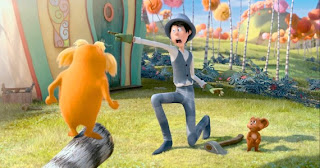Dr. Seuss' The Lorax Review
Hollywood's fourth Seuss adaptation struggles with storytelling.
Full review by Isaac Handelman
Having been a big fan of the 2010 surprise animated hit Despicable Me, I was cautiously excited when it was announced that the same studio would be forging ahead on an adaptation of one of Dr. Seuss’ most beloved offerings. I had hoped that, despite the wildly fluctuating quality of past Seuss adaptions, the folks at Illumination Entertainment would be able to pull another Horton Hears a Who and make a Lorax adaptation work. Unfortunately, while Dr. Seuss’ The Lorax doesn’t stoop to the lows of that-film-which-must-not-be-named (hint: it stars Mike Myers as a giant talking cat), it’s also a far cry from even beginning to approach the brilliance of its source material.
What’s initially problematic about The Lorax is its structure. The film begins after the original story left off, then recounts the book’s narrative in a series of elongated storytelling sequences before wrapping up back in the “present”. Ted takes center stage as he attempts to impress the girl of his dreams, Audrey, by growing her a fabled tree in a modernized town that hasn’t seen a speck of nature in years. This prompts Ted to seek out the Once-ler and hear his tale, during which we meet the titular Lorax. It’s unclear exactly what the central conflict of the film is meant to be. In fact, it almost seems to be trying to juggle two, and neither feels all too interesting or fleshed out because of this.
This is partially due to the cast of characters who, while initially appearing colorful, are actually quite boring. Not a single character truly grasped my interest, gained my support or affection throughout the film’s runtime. Ted is a bland, generic protagonist, and the Once-ler comes across as little more than a glorified bully. Even the iconic Lorax is reduced to a preachy, somewhat dopey little creature with little significance other than to take repeated measures to evict the Once-ler from his homeland in the film’s flashback sequences. These small acts of defiance seem to do little beyond artificially extending the film’s running time by a few minutes here and there.
Which brings us to what is perhaps the film’s most pivotal -- and obvious -- stumbling point. This picture book simply wasn’t meant to be sustained through a ninety minute feature-length film, and it shows. The folks at Illumination took numerous, and often admittedly creative steps towards extending the central narrative of the story. While the modernized narrative isn’t bad, it pales in comparison to the elements which were lifted directly from the book. This serves as a painful recurring reminder of how inferior The Lorax is to the book.
Often, animated films with middling narratives are redeemable through a broad range of humor appealing to adults and children alike, which allows all age groups to enjoy a film. The Lorax does not manage to accomplish this in the scheme of things. A few chuckles here and there won’t disguise the fact that laughs for anyone above the age of ten or so are disappointingly scarce here.
Luckily, the animation is as sharp as can be regularly expected in this day and age. Despite a few odd moments where the CGI appears almost like stop-motion, the film looks great. Characters are endearingly disproportional, the scenery is colorful, and everything simply pops. Visually, at least,The Lorax is vibrant.
It’s disappointing that the folks at Illumination weren’t able to pull The Lorax off. This mediocre product obviously did not come about from a lack of effort, but perhaps a relatively small trough of potential ideas, as must always be the case when adapting a picture book. This doesn’t excuse the fact that, outside of the heartwarming messages and memorable base narrative strung together by Seuss himself, the film feels bland, lifeless, and not all too interesting. Being considered the second best Seuss film adaptation ever just isn’t saying much these days.
Final Score:
4.5/10
"Subpar"




Comments
Post a Comment